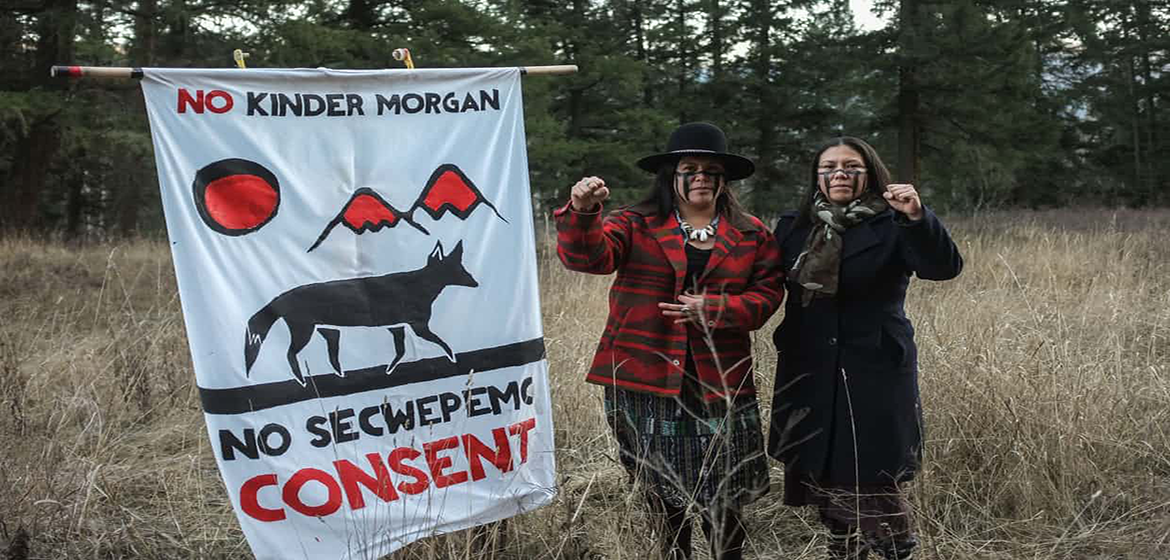By Ashifa Kassam
Much of Kinder Morgan pipeline’s proposed route lies within Secwepemc territory, and locals describe their fightback as ‘a matter of life and death’
In the heart of the Canadian province of British Columbia, dozens of activists have been gathering to saw lumber, raise walls and install windows. By the time their work is done, 10 tiny homes will have been built – all in the name of thwarting a pipeline.
Launched by a group called the , the plan is to strategically deploy the homes to block the the expansion of the running from Alberta’s oil sands to the Pacific coast.
More than half of the Trans Mountain Expansion’s proposed route lies within Secwepemc territory, home to 17 First Nations bands and the .
“Our land is our home,” said Kanahus Manuel, who helped to launch Tiny House Warriors last year. “We’re putting tiny houses out there to scream that message to the world: pushing a pipeline through is tearing through our home.”
Efforts to stop the pipeline expansion have heated up in recent weeks, and have joined indigenous-led protests in British Columbia.
The project, which still needs to obtain numerous local permits and approvals, has pitted The pipeline would nearly triple the flow of the province’s landlocked bitumen to the west coast, but British Columbia fears the dramatic increase to oil tanker traffic in the Pacific could have an impact on its multibillion-dollar tourism industry.
The pipeline’s owner, a subsidiary of the Texas-based energy company Kinder Morgan, announced it would walk away from the project unless it saw a clear path to completion by the end of May.
Justin Trudeau, Canada’s prime minister, to push forward the pipeline, which he described as “a vital strategic interest to Canada” .
In Secwepemc territory, which stretches across a wide swath of south-central British Columbia, the battle against the pipeline rings personal. “We feel like it’s a matter of life and death,” said Manuel. “We’ve depended on this land for tens of thousands of years. That’s the risk that we’re facing with the pipeline. And the uncertainty is whether our kids are going to be able to drink this water in 50 years.”
Last year a Secwepemc assembly declared its opposition to the pipeline, even though three of the territory’s bands have signed agreements allowing the pipeline access. Among those supporting the project is Simpcw First Nation, who say they hold the title to one-third of the land that the pipeline aims to traverse.
Simpcw leaders said the decision to grant access came after the community carried out their own environmental assessment review and negotiated an agreement that was approved by 78% of voters in a referendum. “If the project does not go ahead, we will lose out on opportunities that we have been working hard at obtaining in the last year or so,” Simpcw councillor Don Matthew said in a statement.
But those behind Tiny House Warriors point out that 17 bands call Secwepemc territory home. “No one person could sign over land that’s going to impact our collective right and title to our territory,” said Manuel.
The territory is unceded, meaning no treaties were ever signed between and the Secwepemc.
At a build site 50km east of Kamloops, the group has so far built two of the tiny homes and a third is nearing completion. Secwepemc muralists and other artists will decorate each home with images drawn from the community’s traditional stories.
The idea of using tiny houses seemed like a perfect fit to express the assembly’s opposition, said Manuel: juxtaposing a symbol of sustainable living against the environmental threat posed by the Trans Mountain project.
What’s more, the homes can be built quickly and – because they are mobile – be moved around easily, assuaging the concerns of those who were part of a 2001 attempt to block the construction of a ski resort on their hunting and medicine-harvesting grounds.
During that protest, community members built a cordwood house and a cabin on the land in hopes of hindering the development, only to watch as their work was bulldozed and members slapped with trespassing charges.
This time the structures will be on wheels, said Manuel. “We didn’t want to be targeted and caught up in injunctions,” she added. “That’s not what we’re here for. We’re here to stop a pipeline.”
The solar-powered homes will be used to house families in need, and some will likely be set aside to house language and cultural camps. After funds from Greenpeace helped to build the first house, crowdfunding campaigns enabled the group to easily raise the approximately C$5,000 needed to cover the cost of each house.
Manuel is hoping the small homes will offer a big platform for those in the community who have concerns over the project.
“We know how it is when people see the militant, camouflaged masked-up native blocking the road or burning tires,” she said. “We know that that’s the frustration and the rage that a lot of our young people feel. But we know that we need to be creative because we know they have bigger guns, more handcuffs and police to take us away. We have to be creative with our resistance.”
Source:
Related to SDG 7: Affordable and clean energy, SDg 15: Life on land and SDG 10: Reduced inequalities



